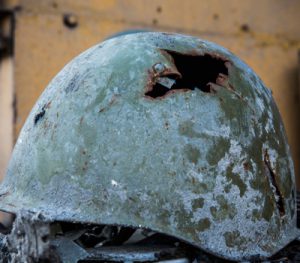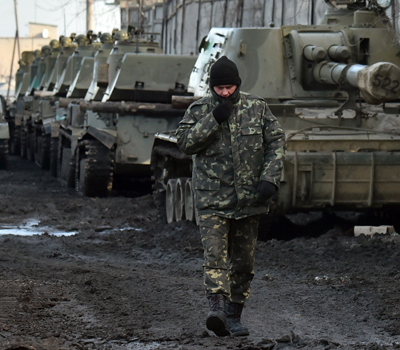As violence continues in Ukraine, following the agreements reached in Minsk II, the debate now focuses on the West’s support for Kiev, with the shipment of arms – or not – to the Ukrainian government. Esglobal asked experts for and against arming the country and each has defended their position with different arguments.
Yes. Ukraine has the right to defend itself
9 March, 2015. Marcin Zaborowski
While violence in the East and the crisis in relations between Ukraine and Russia continue, the debate on western support for Kiev focuses on the issue of arms shipments to Ukraine. The country is in a state of profound crisis at all levels: it has to fight and make reforms at the same time; its economy is mired in a crisis and its currency has depreciated more than 60% in a matter of only a few months. Democratic consolidation is far from complete and the war effort does not encourage the introduction of any more far-reaching political reforms. The corruption that undermined the Ukrainian state in the past has not by any means been eradicated. Therefore, the fact of providing weapons to Ukraine will not alone provide a magic bullet, nor will it rescue the pro-western orientation of Kiev. What Ukraine needs is extensive aid, comparable to that of the Marshall Plan: aid provided by the United States to Western Europe in the late 40s.
However, in the case of the Marshall Plan, Ukraine also needs the resources to defend itself, and providing it with weapons is an obvious element of support for Kiev.
Here are three essential arguments why the West should supply weapons to Ukraine.
First of all, Ukraine does not want to possess weapons for offensive purposes. Ukraine does not desire to attack any other state but needs to defend its own territory. Just over a year ago, Russia violated international law by annexing the Ukrainian territory of Crimea. Since then, Russia has adopted the doctrine of intervening wherever ethnic Russian minorities reside. That includes south-eastern Ukraine where Russian units are operating – but also strips of Belarus, Kazakhstan, Moldova, and other countries belonging to the former Soviet Union, including members of NATO and the European Union in the Baltic region.
An embargo which is weakening Ukraine. While the separatists have weapons, thanks to Russia – and Russia itself is intervening in eastern Ukraine – the West has adopted a de facto embargo that prejudices the state, which is the victim of foreign aggression. That has created an imbalance of power in south-eastern Ukraine, where separatists are constantly increasing their capacity to act, while the Ukrainian forces are becoming depleted.
The argument that providing weapons to Ukraine would intensify the conflict – while not doing so would defuse it – does not hold true.
Up till now Ukraine has not received support, but, far from abating, the conflict has actually got worse. Clearly, Russia has interpreted the fact that Kiev has no help as a sign of weakness that has done nothing but increase Russian incursions into Ukrainian territory.
Arms shipments will not be enough to rescue the Ukrainian state, but this is an indispensable element in enabling the country to survive any foreign aggression. If we do not provide Ukraine with the necessary resources to defend its sovereignty, over the coming months we will see some other country’s sovereignty violated. Once the situation affects the member states of the EU and NATO, the West will have no choice but to react, and then we will be facing a much more serious crisis than the current one.
No. Arming only intensifies the conflict
9 March, 2015. Ruth Ferrero Turrión
The question – Do we arm Ukraine? – is incomplete, or at least partially. The real question should be, what would be the consequences of arming it? And maybe we could be more specific and ask ourselves: will Russia be dissuaded from going further, knowing that the cost of not having Kiev under its control will be very high strategically? Vladimir Putin is aware of his military superiority in the field. Will he withdraw in the face of a threat from NATO? Or will he launch an even more expansive attack?
The answers to these questions may vary depending on the audience, but what all analysts  appear to agree on is that the conflict in Ukraine will not be solved by giving more weapons to Kiev, as that would only cause an upsurge in the conflict. The Ukrainian authorities are well aware of this; however, encouraged by Washington and other capitals of Eastern Europe, they have not ceased in their efforts to order weaponry for their Army. President Poroshenko, despite having signed the Minsk II agreement just a month ago, is asking for weapons and is also meeting with American arms companies in Abu Dhabi and with representatives of the Pentagon, which seems totally contradictory.
appear to agree on is that the conflict in Ukraine will not be solved by giving more weapons to Kiev, as that would only cause an upsurge in the conflict. The Ukrainian authorities are well aware of this; however, encouraged by Washington and other capitals of Eastern Europe, they have not ceased in their efforts to order weaponry for their Army. President Poroshenko, despite having signed the Minsk II agreement just a month ago, is asking for weapons and is also meeting with American arms companies in Abu Dhabi and with representatives of the Pentagon, which seems totally contradictory.
Four arguments can assist in the debate and reflection on this question:
Ukraine could never win a conventional war against Russia. It has not modernized its army sufficiently, nor its supplies or weapons, while Moscow has done just that … Even if weapons and new devices are provided by third countries, it is unlikely that a war of this kind could be won. As we have witnessed in the battle of Debaltsevo, the Ukrainian Army has no human or technical capabilities to face a war machine as powerful as the Russian one. Preparing an army for war is not easy: it is not just a question of providing weaponry and equipment: soldiers need to be trained to use the new weapons. And this is not achieved overnight but in the medium term – and in circumstances less dramatic than those that Ukraine is currently living through, with a massive economic crisis that could become even more acute if the conflict worsens further. Arming Ukraine would only increase the certain humiliation of Kiev’s troops against the Russian forces. Poroshenko needs to be convinced that the best alternative to the crisis are the constitutional reform processes that lead to decentralization, and the implementation of urgent economic reforms in the country. Reaching a negotiated agreement between the parties is always preferable to an entrenched conflict or an escalation of violence.
A hybrid war is not won with guns. The conflict taking place in Ukraine could be put into the category of hybrid warfare. This type combines in a coordinated way covert intelligence operations, propaganda action, sabotage, economic and energy supply pressure, conventional warfare tactics such as bringing in weapons to the territory, troop training, and so on, all with the final goal of destabilizing the country.
Arming one faction does not solve the problem. As has been observed in other cases, such as Libya, Iraq or Syria, arming supposed “allies” of the West has never succeeded in any case, apart from the fact that an opponent has never before been as powerful militarily as the Russian Federation. Moreover, in many cases, these supposed friends have, in the end, turned out to be their worst enemies, starting with Bin Laden, and ending with Al Assad.
An escalation of the conflict could internationalize it further. Arming Ukraine would only contribute to more offensives around the Donbass region by the army of Kiev, which could cause open intervention by Russia in the conflict, including a full-scale invasion. In this case one might wonder whether the European Union, the United States and NATO would be prepared to defend Ukraine with all its consequences, and enter directly into the conflict, despite opinions publicly expressed. Russia, meanwhile, could interpret this help to Kiev as a direct threat to its security and sovereignty, coupled with the fear of the potential entry of Ukraine into the EU and NATO, and the fear of the contagious effect of popular protests, that would no doubt bring on open intervention, with public opinion in favour.



